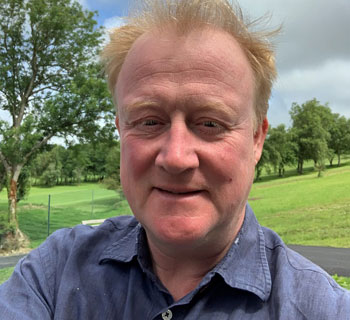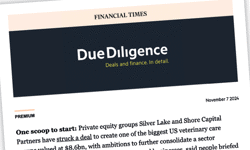
One of the greatest irritations of being a journalist is the number of times friends and acquaintances say when they see a story in the papers about something they know about – “it’s wrong!”.
Apart from being a terrible cliché, often they are only talking about a small, misplaced, purist detail. There is also little appreciation of the time pressure many journalists are under.
Sometimes, however, the press critics are right and some stories could indeed be more accurate, and can indeed be plain wrong.
Edward Iliffe, chief executive of Iliffe Media, the fourth generation of his family to run the local newspaper group, found this out the hard way when he was at the centre of a story that made the nationals.
His nearly-completed four-storey, wooden, eco-friendly house being constructed on private Green Island in Poole harbour, burned down because of a building accident.
You can hear the irritation in his voice more than a decade later, as he describes finding himself at the centre of the coverage.
“Within the space of two or three hours, it was on all the various newspaper websites. Only one newspaper had the courtesy to ring me up and that happened to be the Daily Telegraph. The rest just made it all up, mostly inaccurately,” claims Iliffe.
One paper said he hadn’t bothered to go to the remote location, while at the same time publishing a photograph in which he appeared.

“I just think that is sloppy journalism and quite frankly there is no excuse for it. If the industry continues to go down that route, there won’t be an industry,” insists Iliffe who is perfectly placed to take a long-term view. The family’s first investment in the industry came in 1891 with the publication of the Midland Daily News, which became the Coventry Evening Telegraph.
The irritation over the fire coverage was compounded a few years later when it was reported that he had lost out in the resulting legal battles when, actually, it was one builder losing out to another. Iliffe does concede that this was a bit of a technicality because his name had been on the insurance policy.
Iliffe, who is 52, also complains about newspapers being obsessed with people’s age and money. The coverage did highlight the fact that Iliffe family wealth at the time was believed to be around £240 million mainly because of the family’s main diversified company the Yattendon Group, of which Edward Iliffe is also chief executive.
Iliffe does concede that things can occasionally go awry even in the best managed of newspapers when the wrong picture of cricketer Ollie Robinson appeared in an Iliffe title. How many people know that there are two cricketers called Ollie Robinson?
If the industry continues to go down that route, there won’t be an industry.
Phone hacking eroded trust
If Iliffe believes greater emphasis on accuracy is needed in newspapers, he also thinks the phone-hacking scandal had a serious and lasting effect on the reputation of newspapers and journalists – even local newspapers like his which had nothing whatever to do with the practice.
“We were damaged by association because we are all in the same industry. It is a massive trust issue that hit the industry in a bad way. You had a double whammy, that and the social media,” explains Iliffe.
The newspaper owner adds: “I think the phone hacking scandal was spectacularly badly dealt with. Why people weren’t prosecuted and dealt with quickly I don’t know.”
By now, it would have been entirely possible for the Iliffes to have left the newspaper industry behind.
The company was an integral part of Local World set up by David Montgomery in 2012, which also brought together the local and regional newspaper interests of the Daily Mail and General Trust.
The intention was to embrace the newer technologies, amid a recognition that increased scale was important. When a deal was done with Reach (then called Trinity Mirror), publishers of the Daily Mirror, Iliffe Media did not try to block it as they could have done. Instead Iliffe negotiated what they believed was a deal to keep the Cambridge area newspapers.
“As far as I was concerned, they (Reach) reneged on the deal. Yes, we were compensated but that really wasn’t the purpose of the exercise,” Iliffe says.
Local World, he believes, was “a success in its own way,” although as far as Iliffe was concerned, it had not run its intended course. The company did receive more than 20 per cent of a deal worth £220 million.
We were damaged by association because we are all in the same industry.
Stick or quit?
That was the point when Iliffe could have given up papers and taken his money elsewhere, though the family companies still owned the presses of the Cambridge News and its building.
“I enjoy the business. You have got to do something and invest your money in something and I believe it’s an industry that has a long-term future,” insists Iliffe who might in the fullness of time become the fourth Baron Iliffe.
Iliffe practised as a chartered surveyor for four years, mainly in commercial property, before working in the newspaper industry.
“It’s always been an interest. It’s a privilege to be able to communicate with such a large audience potentially. I am not writing anything personally. No. I failed English,” says Iliffe.
“You meet so many interesting people if you are doing your job properly,” he adds.
Initially Iliffe Media started the Cambridge Independent as a paid-for weekly “producing primarily good quality content” against the Cambridge News.
Iliffe wasn’t allowed to tout for staff but he was allowed to advertise and Paul Brackley, editor of the Cambridge News applied. Now, he is editorial director of the Cambridge Independent, which has won four awards.
Gradually, a small group has been put together of around 36 local titles – including the Stamford Mercury founded in 1712, which claims to be the oldest, continually published British newspaper. The Newbury Weekly News joined the group in 2019. The size of Iliffe Media rises to 50 titles when a joint venture in Scotland is included.
A small family-owned newspaper group can be sustainable and self-sufficient as long as it is true to its local roots.
Sustainable future
But didn’t Edward Iliffe join Local World to achieve scale rather than being a small local group?
He believes a small family-owned newspaper group can be sustainable and self-sufficient as long as, rather like the current Montgomery model, it is true to its local roots and has local editors in charge on the ground.
There are no large pension funds or debt to worry about.
“The main issue of the three larger (regional) groups is that they are all overstretched with debt, either because they have borrowed a lot of money or they have a pension deficit. It’s just a fact of life and it’s not unique to newspapers,” says Iliffe.
His business is profitable, although not as profitable as it once was. Revenues will never come back to where they were but there is no reason, he believes, why a local paper cannot be “a trusted provider of news, services and usefulness in its own location,” boxes the social media cannot tick.
Iliffe Media will continue printing paper editions as long as people want them, but Iliffe believes the green agenda for lower consumption of paper will increasingly push the younger generation towards reading on electronic devices.
The 10-15 year life expectancy of the Cambridge presses might give a clue to the possible length of the transition from print to digital-only at Iliffe Media.
“The broad thrust of what we are trying to do is positive and constructive and holding people to account where appropriate within the regulations, as long as it is properly researched,” he explains.
We are just another business and we need to try to develop a product in our market. I don’t think we should have any privileges.
A subs future
Meanwhile, Iliffe is placing considerable emphasis for the future on moving towards subscription and lessening the dependence on advertising.
For £4.99 a month, an Iliffe Media subscriber can get access electronically to all the Iliffe titles although the chief executive concedes that the numbers reading both Cambridge and Inverness news is probably close to zero.
From such a base you can track what audiences are interested in and create digital supplements – perhaps, for example, bringing together the writings of local MPs for those interested in politics.
One of its titles, the Newmarket Journal, happens to have an interesting local MP, the former health secretary, Matt Hancock.
Next up, Iliffe would like to be able to add stories in real time to the digital offering to improve the reader experience.
“Our online audiences are off the scale,” he says, while acknowledging that though digital subscriptions are increasing, they are still in the low thousands.
The newspaper owner believes that will change as more and more people get used to paying subscriptions for multiple devices and services.
He is not one of those seeking specific help for the newspaper industry from government, apart from encouraging media literacy through education and for the BBC to credit local publications more when they “use or borrow” their content.
“My view is that we are just another business and we need to try to develop a product in our market. I don’t think we should have any privileges,” Iliffe suggests.
He would though like to see a more level playing field in the competition with the social media giants and believes that regulation is coming their way.
“They should be deemed to be publishers which currently they are not,” he argues. Such a transformation alone would make them subject to many of the regulations traditional newspapers face and they should also pay their fair share of taxes.
Iliffe believes the government’s current Online Safety Bill will also help.
Overall, Edward Iliffe is optimistic about the future of local newspapers as long as they respect the need for accuracy, local accountability and heritage.
“I look at the industry as almost in start-up mode at the moment. Trying to figure out the way forwards. What is the future? How is it going to work?”, asks Edward Iliffe.
“I think it will find a way,” he adds with conviction.
This article was first published in InPublishing magazine. If you would like to be added to the free mailing list, please register here.










